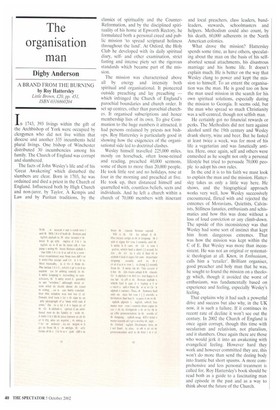The organisation man
Digby Anderson
A BRAND FROM THE BURNING by Roy Hattersley Little Brown, £20, pp. 451, ISBN 0316860209 In 1743, 393 livings within the gift of the Archbishop of York were occupied by clergymen who did not live within that diocese and another 335 incumbents held plural livings. One bishop of Winchester distributed 30 incumbencies among his family. The Church of England was corrupt and slumbered.
The facts of John Wesley's life and of his 'Great Awakening' which disturbed the slumbers are clear. Born in 1703, he was ordained and died a priest in the Church of England. Influenced both by High Church and non-juror, by Taylor, A Kempis and Law and by Puritan traditions, by the classics of spirituality and the CounterReformation, and by the disciplined spirituality of his home at Epworth Rectory, he formulated both a personal creed and public mission 'to spread scriptural holiness throughout the land'. At Oxford. the Holy Club he developed with its daily spiritual diary, selfand other examination, strict fasting and intense piety set the rigorous standards which became part of the mission.
The mission was characterised above all by energy and intensity both spiritual and organisational. It pioneered outside preaching and lay preaching — which infringed the Church of England's parochial boundaries and church order. It set up centres, other than parochial churches. It organised subscriptions and hence membership lists of its own. To give Communion to the huge numbers it attracted, it had persons ordained by priests not bishops. Roy Hattersley is particularly good in showing how the exigencies of the organisational side led to doctrinal clashes.
Wesley himself travelled 225,000 miles, mostly on horseback, often loose-reined and reading, preached 40,000 sermons, some of them to more than 20,000 people. He took little rest and no holidays, rose at four in the morning and preached at five. He took up, then distanced himself and quarrelled with, countless beliefs, sects and individuals. And he left a church within a church of 70,000 members with itinerant and local preachers, class leaders, bandleaders, stewards, schoolmasters and helpers. Methodism could also count, by his death, 60,000 adherents in the North American colonies.
What drove the mission? Hattersley spends some time, as have others, speculating about the man on the basis of his selfaborted sexual attachments, his disastrous marriage and his home life. It doesn't explain much. He is better on the way that Wesley clung to power and kept the mission to himself. To an extent the organisation was the man. He is good too on how the man used mission in the search for his own spiritual solutions, especially during the mission to Georgia. It seems odd, but the man who spread so much Christianity was a self-centred, though not selfish man.
He certainly got no financial rewards or perks. The Methodists did not turn against alcohol until the 19th century and Wesley drank sherry, wine and beer. But he fasted at least twice a week, was for most of his life a vegetarian and was fanatically antitea. Here, once again, self and others were enmeshed as he sought not only a personal lifestyle but tried to persuade 70,000 people to adopt his own rules.
In the end it is to his faith we must look to explain the man and the mission. Hattersley takes us only a little way here. He shows, and the biographical approach works very well, how Wesley successively encountered, flirted with and rejected the extremes of Moravians, Quietists, Calvinists, Stillness fanatics, enthusiasts and schismatics and how this was done without a loss of loud conviction or any climb-down. The upside of this inconsistency was that Wesley had some sort of instinct that kept him from dangerous extremes. That was how the mission was kept within the C of E. But Wesley was more than inconsistent. He was not an original or systematic theologian at all. Knox, in Enthusiasm, calls him a 'retailer'. Brilliant organiser, good preacher and holy man that he was, he sought to found the mission on a theology which, though it avoided the worst of enthusiasm, was fundamentally based on experience and feeling, especially Wesley's feeling.
That explains why it had such a powerful drive and success but also why, in the UK now, it is such a failure. If it continues its recent rate of decline it won't see out the century. In 2002 the Church of England is once again corrupt, though this time with secularism and relativism, not pluralism, and it slumbers. Once again there are those who would jerk it into an awakening with evangelical feeling. However hard they work and however committed they are, this won't do more than send the dozing body into frantic but short spasms. A more comprehensive and less personal treatment is called for. Roy Hattersley's book should be read both as a guide to a fascinating man and episode in the past and as a way to think about the future of the Church.




































































 Previous page
Previous page